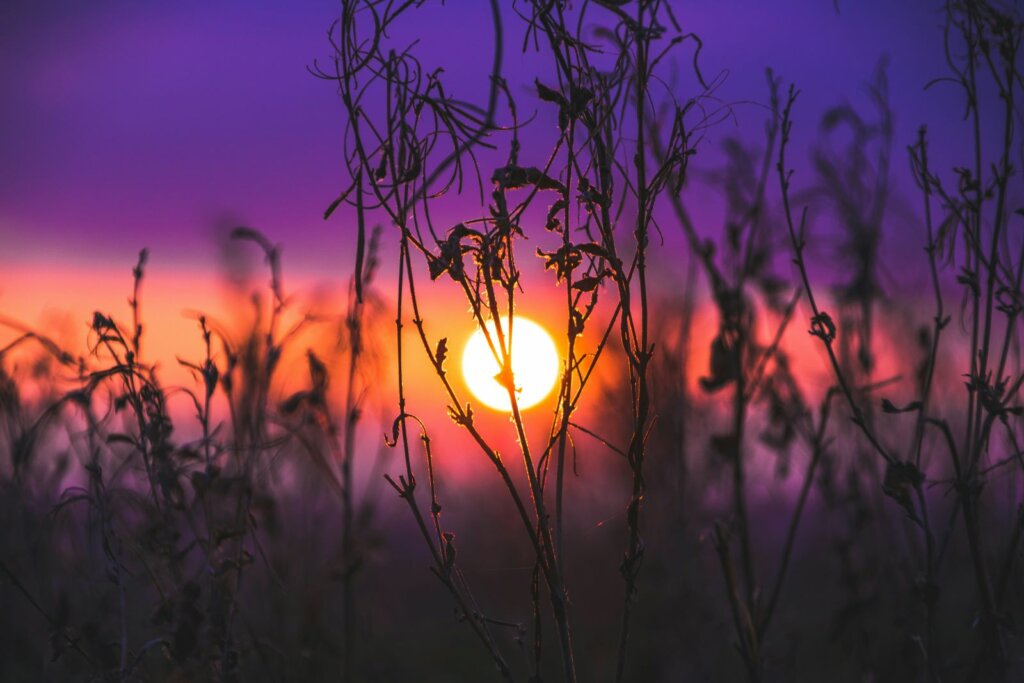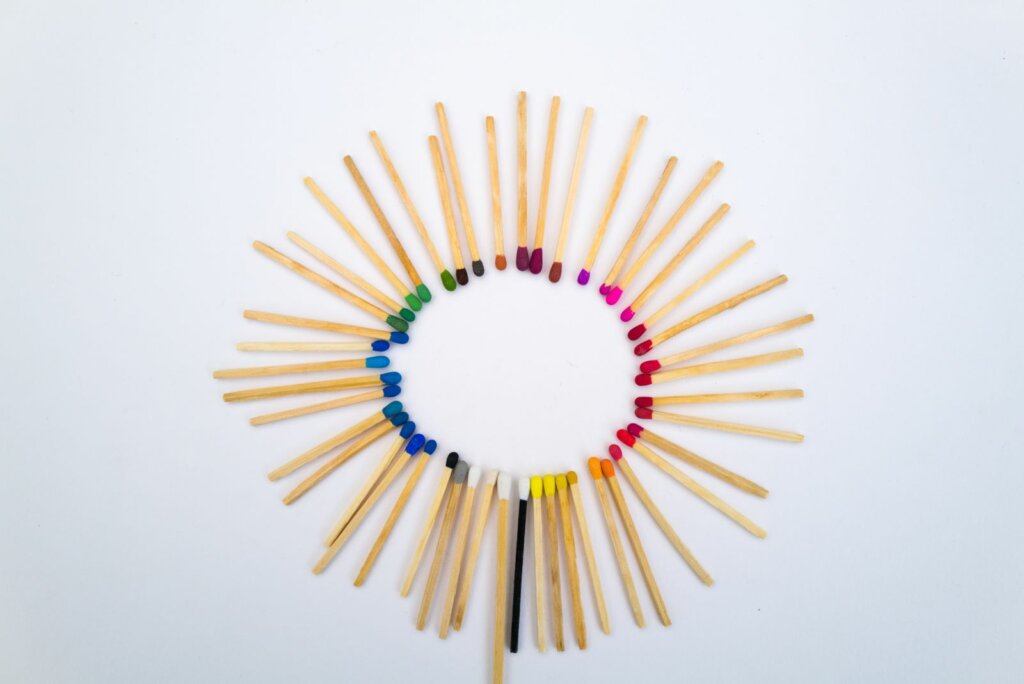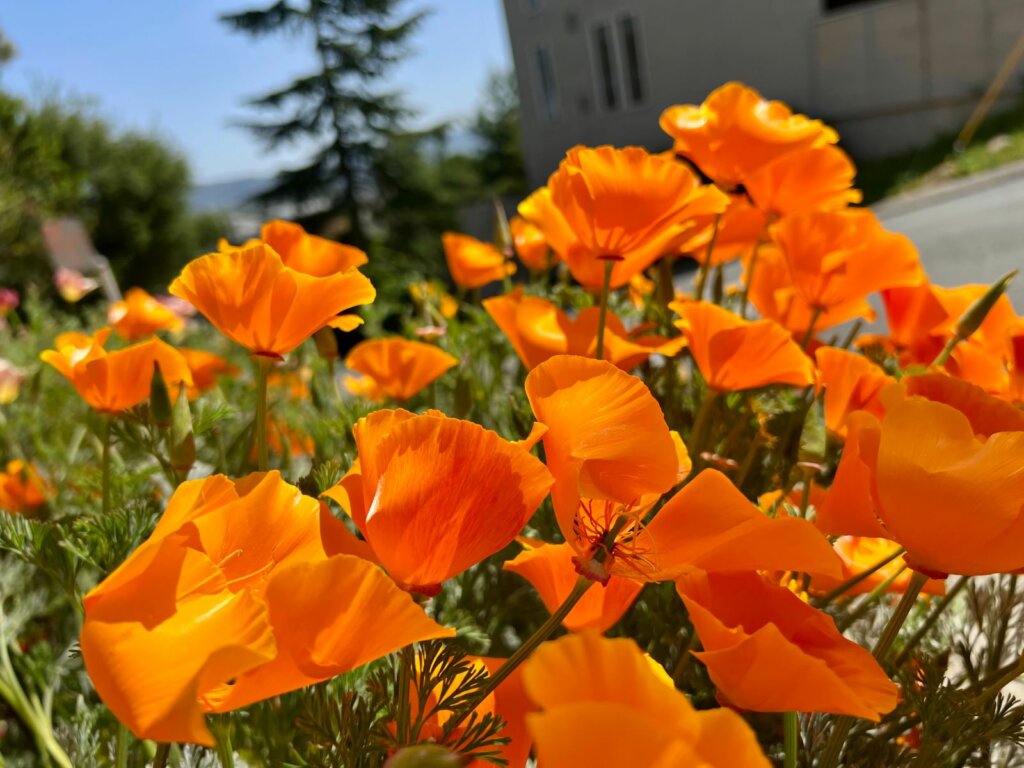I feel unmoored because a very significant relationship has entered a new era. For context, this is a person who knows everything about me – all the things I want to keep hidden, my missteps, the self-destructive thoughts and actions – everything. She’s witnessed every crisis and every celebration from the last 12 years. She’s offered guidance, care, and support through it all and played an enormous role in me being the person I am today. In other words, she’s a true MVP. But now she’s not available like she was before and my inner child is freaking out.
It’s not only about the change in this relationship. It’s about the many, many changes over the past month. The things I thought were steady have turned out to be not so steady. Other relationships have dropped off, regular events have come to an end, and people died. All of it has me asking, “What can I even hold onto? What can I count on?”
What’s funny is that sometimes the universe gives me the answers to my questions in advance. Earlier this month, I had a conversation with a friend about precisely this topic. I told him the constant, unchangeable, permanent entity in our shared spiritual tradition is called Sat and that when we meditate, we are practicing Iishvara prańidhána. “Iishvara” means controller of the universe and “prańidhána” means to adopt something as a shelter. Therefore, Iishvara prańidhána means to adopt the controller of the universe as a shelter. It means to take refuge in the controller of the universe. In other words, to remember what is truly unchangeable.
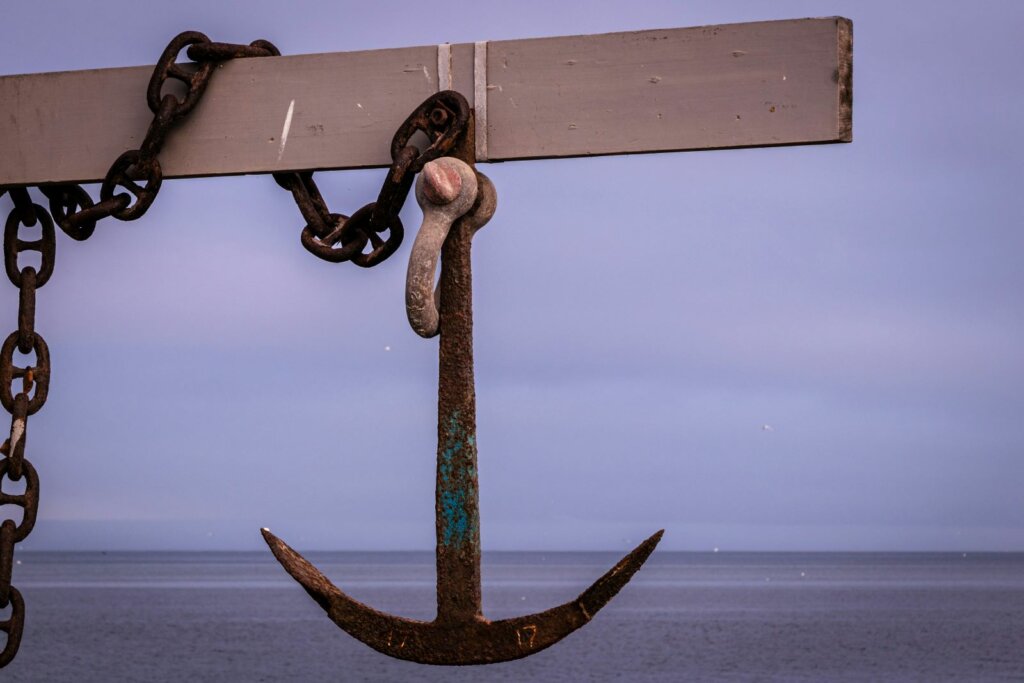
We all need an anchor. Photo by Grant Durr on Unsplash
The joke’s on me because I thought I was having a casual conversation about spiritual philosophy with a newcomer when instead I was laying the groundwork for a huge spiritual lesson. My inner child, and other parts of me, want good things to stay the same. We want cherished relationships to remain steady and ever-present but they don’t. The nature of this universe is to change and I can no more stop things from changing than I can control when the sun sets.
When I contemplate how everything changes, I could curl into the fetal position and rock myself or I could do what my spiritual teacher suggests, which is to remember what is actually permanent, unchangeable, constant, and steady. Yes, it’s the Cosmic Consciousness but there’s also a relationship with that entity that’s important to remember.
He tells us that Cosmic Consciousness is our one true friend, and even more than that, the Divine Beloved is bandhu, or a person or entity who cannot stand separation. According to my spiritual philosophy, Cosmic Consciousness is inextricably involved with everything and cannot stand to be separated from Its creations.
Everyone else will come and go but the Divine Beloved is with me now, forever, and always through every lifetime. In this period of my life where so much is upending, it’s nice to remember I do have a reliable friend I can turn to all the time in all the ways. There is something I can hold onto like an anchor when I feel adrift at sea and that something is the Divine Beloved.
I dream of a world where we remember the only constant in life is change. A world where we stop trying to make impermanent things permanent. A world where we know where to turn when life gets choppy and we need something steady. A world where we recognize there is something we can hold onto and that something is the Divine Beloved.
Another world is not only possible, it’s probable.
I have some notes for the cosmic powers that be. Is there a way to lodge complaints? A manager I can speak to? No? Who designed this system?!? At times like these, I understand why people question the existence of God/Higher Power/Source, etc. because if there is a God, why would It allow all these awful things to happen?
I think about this a lot both in terms of my personal life and in the broader world. Being the human I am, I want the world to revolve around me. I want things to go how I think they should go and struggle when they don’t. However, I have enough humility to recognize my perspective is limited. I’m not omniscient, omnipresent, or omnipotent but I do believe there is an entity that has all those traits.
If that’s so, then how can I account for all the atrocities in the world? Wouldn’t an all-powerful loving entity want to stop things like war? First off, yes, which is why every spiritual teacher ever preaches love, acceptance, and respect. The sticky wicket is that humans have free will. According to my spiritual philosophy, we are all on a spiritual journey. Not just humans but plants and animals too. Plants and animals are moving instinctually toward Cosmic Consciousness but humans have the blessing? the curse? of being able to choose whether they want to move closer or further away. And sometimes people choose things that I wouldn’t.
But an omnipotent entity can make anything happen because that’s what omnipotent means so why wouldn’t a loving Higher Power intervene in these instances? Why wouldn’t a loving Higher Power say, “I’m putting a stop to all this conflict”? The answer I keep coming to VERY begrudgingly is in this spiritual journey, Cosmic Consciousness is playing the long game. It’s not only about what happens today, tomorrow, or 50 years from now. It’s about what happens 500 years from now, 5,000 years from now. What will best serve humanity’s evolution? What will help us evolve as a species?
I hate this answer, truly I do, but sometimes what helps us grow the most is strife. I used this quote just the other week but it’s again applicable: “Whenever there is clash or conflict within any structure, whether subtle or crude, it acquires subtlety. This applies to both psychic clash and physical clash. The more subtle the crude mind becomes as a result of internal clash, the greater its spiritual awakening.”
In other words, I think society is undergoing a spiritual awakening. Do I love the mechanism for it? Not in the least, but I’m choosing to believe this is part of a larger plan that I’m not privy to. That all this psychic and physical clash is fertilizer for our evolution, leading us somewhere we want to go.
To quote my spiritual teacher again, “All human beings want light. One individual human is more luminous and more throbbing than that universal darkness. So human beings should always be optimistic. The cimmerian darkness cannot retard your progress, cannot cover the light of the human heart. The spirit of your heart must move on and on against obstacles. Kick away your obstacles like pebbles from your feet – you are stronger than your obstacles.”
I firmly believe the obstacle we are kicking away from our feet is narrow-mindedness and anything that seeks to strip us of our humanity. Whatever reduces people to segmented groups, whatever urges binary ways of thinking and acting, whatever encourages us to cover the light of our hearts is what we’re working to get rid of day by day, little by little until eventually, more of us will be spiritually awake than asleep.
I dream of a world where we take heart in trying times because we understand there’s something bigger than us happening. A world where we realize we are each playing a part in a Cosmic drama. A world where we recognize that growth happens in response to clash. A world where we remember society as a whole is experiencing a spiritual awakening.
Another world is not only possible, it’s probable.
No one would describe me as a clumsy person. In fact, it’s just the opposite. I took ballet for years and my reflexes are quick but in the last week, I’m a veritable butterfingers. Objects are literally jumping from my hands. I was in a store the other day and my credit card flew across the counter six feet away and got wedged between a table and the wall. I opened a package and the contents skittered across my kitchen floor.
More energy is coursing through my system, my mind and body are going in a million different directions, and I can’t seem to sit still. Again, that’s highly unusual for me! I generally don’t have problems with focus but these days my insides (and outsides, honestly) feel chaotic, messy, and discombobulated. Normally I’d try to tamp all this down and rein the energy back in but I keep thinking about what my chiropractor tells me about this phase of my healing: “You’re reorganizing.” I’m like a tornado picking up objects and hurtling them to another location.

What I like about this photo is it reminds me of the Pillars of Creation. Photo by Angel Luciano on Unsplash
The question worth asking is, “What will be created from all this disarray?” There’s a quote on my fridge from Friedrich Nietzsche that says, “One must still have chaos in oneself to be able to give birth to a dancing star.” So often chaos is painted as scary, undesirable, something to avoid at all costs but as Reggie Ray, the spiritual director of the Dharma Ocean, said in a dharma talk, “Chaos is the source of life.”
Oooooh boy. Chaos is the source of life? It’s not order and structure? Sadly, no. As we are all aware, we are made up of stardust, to paraphrase Carl Sagan. To quote an article on the subject:
“The carbon, nitrogen, and oxygen atoms in our bodies, as well as atoms of all other heavy elements, were created in previous generations of stars over 4.5 billion years ago. Because humans and every other animal as well as most of the matter on Earth contain these elements, we are literally made of star stuff.”
What that means is we’re the product of chaos. All the debris from supernovas exploding and comets colliding led to us. It also led to some of the things we consider the most precious. Ultra-high precision analyses of some of the oldest rock samples on Earth by researchers at the University of Bristol provide clear evidence that “the planet’s accessible reserves of precious metals are the result of a bombardment of meteorites more than 200 million years after Earth was formed.” Gold? Platinum? Both here because of meteors.
In my spiritual tradition, we use the word “clash” a lot, which describes the meeting of opposing forces. If you think about it, that’s basically what chaos is. One force is striving for order, the familiar, the steady whereas another is calling for disorder, the new, the unsteady. My spiritual teacher says, “Whenever there is clash or conflict within any structure, whether subtle or crude, it acquires subtlety. This applies to both psychic clash and physical clash. The more subtle the crude mind becomes as a result of internal clash, the greater its spiritual awakening.”
What’s happening to me, I think, is another spiritual awakening where I’m becoming more myself but to create that new me requires some chaos.
I dream of a world where we understand to create something new, including ourselves, requires chaos sometimes. A world where we recognize there may be gold waiting for us at the end of an unstable period. A world where we realize internal clash and conflict is an asset, spurring spiritual growth.
Another world is not only possible, it’s probable.
I’ve shared this quote with three people this week so it seems like a good topic to blog about. My sponsor always tells me, “God is slow but He’s always on time. When it’s time He moves fast, so be ready.” My own life is moving at the pace of frozen molasses but things are happening quickly for those around me.
One friend went from looking for a new place to live to moving three weeks later. Another went from thinking of buying a house to putting in an offer in a week. A third queried literary agents for months and then after attending a conference was offered representation a few days later. For all these friends, the rumination and wheel-spinning lasted for months. The desire to move, to buy a house, to find a literary agent weighed on them, oftentimes feeling like a slog. And then, suddenly, boom. It happened. And it happened swiftly.
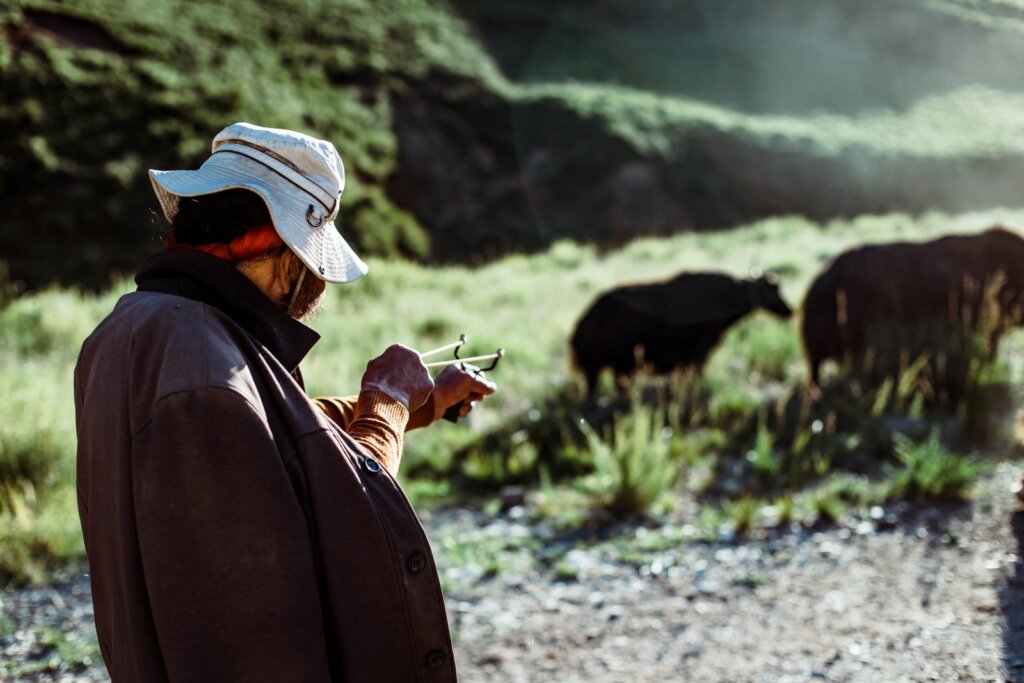
Sometimes we need to hold tight before moving forward. Photo by Gregory Hayes on Unsplash
This is how movement works, according to my spiritual teacher. It’s systaltic like a heartbeat, which means there’s a pause in between expansion and contraction. He says, “Now everything moves and that movement is of systaltic nature. Wherever there is any movement there is pulsation. Without pulsation there cannot be any movement. And this pulsation, that is movement through speed and pause, is an essential factor for each and every animate or inanimate object. Wherever there is existential factor there must be this pulsation. An entity acquires strength and stamina during the pause phase, and emanates vibration during the speed period. There cannot, however, be any absolute speed or absolute pause in the created world.”
You can think of movement like a slingshot – the more taut you pull a slingshot, the further the object you place within it will fly. It may seem like nothing is happening in your life but that’s only because the universe is gearing up to launch you forward. At least, that’s been my experience.
If you’ve known me for a long time you know I spent literally years looking for a place to live. I moved all over the Bay Area and ventured to Missouri, Seattle, and Washington, D.C. I prayed and prayed and prayed for a home but nothing was ever right. And then in February 2015, a friend posted on Facebook that her neighbor was moving out. He hadn’t even given his 30-day notice before I said, “I’m moving in.” After three years of angst, within a matter of weeks, I finally found a home.
It’s hard for me to remember those times of rapid movement because lately, it feels like all I’m doing is waiting, but as I witness my friends’ lives, I’m reminded things do happen quickly when all the ducks are in a row. When the Cosmic will and the individual will align, we are slingshotted forward. I don’t know when I’ll be in that position again but in the interim, I’m over here getting ready.
I dream of a world where we recognize movement may seem slow but that’s only because it’s not time yet. When the time is right, life zooms ahead so it’s important to be ready. A world where we understand movement is always systaltic and that means before any contraction or expansion there’s a pause. But eventually, we’ll be slingshotted forward.
Another world is not only possible, it’s probable.
I didn’t know this was a saying splashed over Pinterest and Etsy until recently: “Everybody wants to change the world but no one wants to change the toilet paper roll.” Personally, I don’t mind changing the toilet paper roll but I understand the underlying message. When people talk about changing the world, they often think of something big and grand. They fail to realize the little things they do also change the world.
I’m guilty of this too. I have big dreams and pooh pooh the small things I do on a daily or weekly basis that make a difference in the lives of others, as if somehow that doesn’t count because I’m not touching millions. This week offered a perspective shift because I’m sick. Not just sort of sick but really sick. “Sleeping for 12 hours” sick. “Going through tissues more swiftly than I ever have in my life” sick. To top it off, I wasn’t sure if I had COVID because I ran out of tests and felt too terrible to walk to the drugstore to get more.

Sometimes it’s the little things that make all the difference. Photo by Diana Polekhina on Unsplash
While trying to psych myself up to run that errand, my dear friend and former neighbor called. I told them, “I wish you still lived next door because I’m sick and ran out of COVID tests and I would ask you for one if you still lived here.” My friend lives about a 10-minute drive away and said, “Oh, do you want me to drop some off for you?”
You GUYS. My heart melted. Not only did my friend leave two boxes of COVID tests on my doorstep but also a box of tissues because I am a veritable mucus factory over here. In the scheme of things, does dropping off supplies really matter to anyone other than me? No. But that’s the point, it mattered to me and changed my world. That’s what I often forget when it comes to making an impact.
I’ve written about it before, but all of this reminds me of the starfish story. If you’re unfamiliar, it goes like this: One day a man was walking along the beach littered with starfish, also called sea stars. He noticed a girl picking them up gently throwing them back into the ocean. Approaching the girl, he asked, “What are you doing?” She replied, “Throwing starfish back into the ocean. The surf is up and the tide is going out. If I don’t throw them back, they’ll die.”
The man said, “Don’t you realize there are miles and miles of beach and hundreds of starfish? You can’t make a difference!” After listening politely, the girl bent down, picked up another sea star and threw it back into the ocean. Smiling at the man she said, “I made a difference for that one.”
We change the world by making a difference for one person, one animal, one plant at a time. Yes, sometimes it’s more than that, but even one life changed is tremendous. The point of service isn’t fame and acclaim. It’s not so people write about you in history books. It’s an act of love for the person, animal, or plant that could use some support. As my spiritual teacher says about service, “Try to make them happy with all the sweetness of your heart.” And you do that one person, animal, or plant at a time.
I dream of a world where we recognize the small actions we do can have a lasting effect on the people in our lives. A world where we understand service is about helping others when they need help. A world where we recognize that changing the world doesn’t have to be in a huge way, it can be a little at a time.
Another world is not only possible, it’s probable.
Right now I’m migrating old pictures from my phone to my computer. In part, it’s to create more space but it’s also because I’m in the mood to clean and clear. In other words, I’m acting very much in line with Mercury retrograde, which is the time to reflect, reassess, and remove. Anything that begins with “re” is an appropriate Mercury retrograde activity.
What’s interesting is that instead of looking at the photos with wistfulness and nostalgia like I usually do, I’m struck with the parallels between then and now. My pictures from 2015 and 2016 show me with friends, visiting beautiful places in nature, flying to different states to attend weddings, and smiling with my meditation community. You might say, “That’s always what your pictures show. That’s nothing new,” and while there is consistency, 2015 and 2016 also held an excitement, a verve to my life that I haven’t felt in many years.
In the ensuing eight years, the community I built broke apart, people moved away, relationships changed, and I didn’t have excitement or verve anymore. I was in a different cycle of life. But here I am, with a resurgence of verve and excitement. I’m meeting new people left and right, I’m building community, and there’s more energy. It’s as if the wheel of life turned once more and I’m re-experiencing a similar pattern.
As if to underscore my point, while writing this, an enormous dragonfly whizzed by my window. I haven’t seen a dragonfly where I live for years and I regularly stare out the window. According to animal shamanism, “Dragonfly reminds you that change is the only constant in life. When dragonflies surround you, change is on the horizon …. Dragonfly can also be a positive omen indicating you are ready for a change to take shape in your life. Be flexible and adapt to evolving circumstances and you can progress in ways you haven’t imagined.”
So often when I think of change, I think of linear progress, of transporting me somewhere I’ve never been before. But today I’m realizing change is cyclical, just like everything in nature. We have day becoming night, spring becoming summer, and the moon waxing and waning. Human beings are embedded in nature, we are not separate from it so it makes sense that our changes would also be cyclical.
Change is the only constant in life, which is why my spiritual teacher says, “Here in the universe, nothing is stationary, nothing is fixed. Everything moves; that’s why this universe is called jagat. Movement is its dharma; movement is its innate characteristic.”
We are also moving and sometimes that movement is a spiral. It seems like we’re in the same place, but as with a spiral staircase, we aren’t exactly. We’re approaching the situation with a new perspective from a similar place. And it wasn’t until today that I realized the spiral is also a part of a bigger cycle. In fact, it could be said that we change in cycles.
I dream of a world where we recognize we are always moving and changing. A world where we understand just as nature has its cycles, we do too. A world where we realize change isn’t linear, progressing in a straight line, but more like a spiral shifting us to a similar, but slightly different place every time. A world we understand that we change in cycles.
Another world is not only possible, it’s probable.
For the past almost two weeks I’ve had pain in the spot where my shoulder and neck meet. My chiropractor characterized it as a drum beneath her fingertips. It’s pulsing, it’s intense, and as much as I would like to think it’s only from sleeping weird, I know that’s not the case. The mind and body are connected with the body acting as a roadmap for my life. It marks the terrain.
When I shared with my close friend what’s happening with my body, they said it sounds like I’m in the in-between place of “I’m stuck,” and “I take my power back.” In the chiropractic model I use, network spinal analysis, there are 12 stages of healing. The stages are fluid and not hierarchal, meaning I could cycle from stage 12 to stage three to stage nine all in the same day.
Stage three is “I’m stuck,” and stage four is, “I take my power back.” I struggle with making that jump. I’m really good at being stuck. I repeat patterns over and over again. I find myself in places where I can’t seem to escape from. Taking my power back? Not an easy thing for me. I’d much rather give my power away to someone else. Someone else has all the answers. Someone else knows what I should do. Someone else is the key to my healing. And sometimes that’s true but there’s a difference between saying, “I’m choosing to see this person or take this course/class because it feels in alignment” and “Aaaaaah! I’m stuck, I’m stuck, I’m stuck, let’s try this thing and that thing and that thing. Throw spaghetti at the wall!”
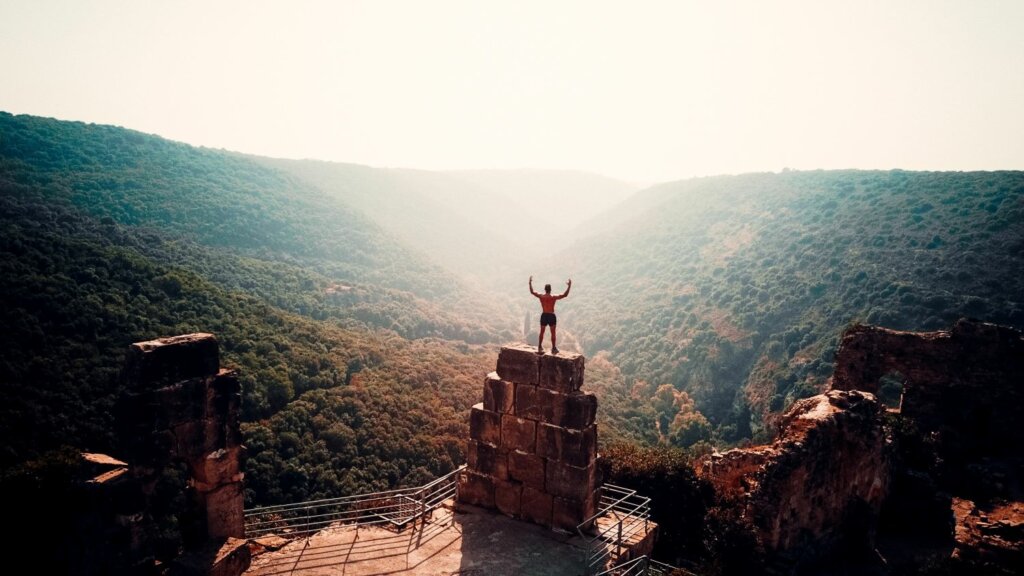
Not a spaghetti picture but a powerful one! Photo by Ameer Basheer on Unsplash
I usually throw spaghetti at the wall. I’m really good at trying random things from a disempowered place. It’s easy for me to take action. It’s not so easy for me to believe in myself. And yet, that’s what I’m here to do. The two tenets of my spiritual practice are self-realization and service to the universe. What is self-realization?
According to my spiritual teacher, “[I]t is the natural wont of each and every living being to see others, not to see [themselves]. That is, whenever one becomes a subjective entity, [they take] others as an objective counterpart, but never the self as an objective counterpart. One’s subjectivity never merges with objectivity and that is the trouble. You want to know so many things but you never want to know yourself. Your ‘self’ is your nearest entity but you never want to know yourself. That is the pity, that is the trouble.”
By knowing the self, I don’t mean just what my favorite color is, or even what my hot-button issues are. Knowing the self means knowing my true self, the self that’s always here, witnessing everything. The calm, quiet, inner voice within that’s ready and willing to help me if I let it. My recovery mentor tells me frequently, “Higher Power is very polite and only goes where invited.” When I invite my Higher Power into my life, that is a form of taking my power back. It’s me saying, “I can trust my self. I can trust my self to lead me where I need to go, to show me what actions to take.”
Knowing the self doesn’t mean becoming egotistical, that you shut out other people and say, “I already know everything.” Instead, knowing the self and taking your power back means being an active participant in your life and recognizing that not only is life happening to you, but you are happening to life. Both are true. There are circumstances outside of our control but some things are not. How are we showing up for life? I, for one, want to take my power back.
I dream of a world where we recognize the wisdom in knowing the self. A world where we understand that doesn’t mean arrogance but rather a recognition that a force within us guides us, shows us, and inspires us when we’re willing to listen. A world where instead of being blown about like a leaf, we take our power back.
Another world is not only possible, it’s probable.
I, like many, have a lot of feelings about the smattering of recent U.S. Supreme Court decisions. And then there are the bills targeting the LGBTQIA+ community. The trend I’m noticing is more divisiveness, more separation, and more hate, frankly. Is this what human beings are destined for? Are we doomed to splinter off into smaller and smaller groups and engage in constant “us versus them” culture wars?
Maybe yes, maybe no but according to neuroscience, our brains are wired for connection and cooperation. Neuroscientist Matthew D. Lieberman, director of UCLA’s Social Cognitive Neuroscience Lab wrote a book called Social: Why Our Brains are Wired to Connect. He says, “To the extent that we can characterize evolution as designing our modern brains, this is what our brains were wired for: reaching out to and interacting with others. These are design features, not flaws. These social adaptations are central to making us the most successful species on earth.”
There’s also a study out of Emory University led by Gregory Berns who learned that when pairs of volunteers cooperated with one another, the reward circuits of the brain were activated. These are the same regions that are activated by drugs. The activation happened only when paired with a human – when the study participants were paired with a computer, they didn’t have the same response.
Volunteers were hooked up to an fMRI scanner and invited to play the “Prisoner’s Dilemma” game. Each volunteer pressed a button to indicate when they were ready to play, and then each simultaneously pushed another button to indicate if they wished to cooperate with, or betray, the other player.
The most common outcome was volunteers mutually cooperated with one another. Berns suggests people are hard-wired to cooperate because the brain associates cooperation with reward. Others are quick to point out that correlation is not causation but I’m inclined to agree with Berns because regardless of whether it’s due to our brains or something else, we want to connect with other people. We are wired for oneness.
What so often gets in the way is exactly what we’re seeing now: socio-sentiment. Socio-sentiment means loyalty to a particular social group to the exclusion of other groups. You already know what a world dominated by socio-sentiment looks like – we’re living in it. What’s the solution?
My spiritual teacher says, “To liberate society from this unbearable situation, consciousness will have to be aroused among the people; their eyes will have to be opened by knowledge. Let them understand the what’s, the why’s, and the where’s. Thus, study is essential, very essential.”
In other words, biologically, we want to connect with others, we’re made for connection, and what’s getting in the way is cultural conditioning that says this group is good and this group is bad. We all do this. The challenge then is to see every person as a human being, not a label. Personally, I do this by practicing empathy and guessing what someone else is feeling and needing. And when I do, I feel even more connected. It’s almost as if my brain is wired for oneness and spurring me on.
I dream of a world where we promote unity instead of division. A world where we recognize we are all humans with the same feelings and needs. A world where we stop propagating socio-sentiment and instead recognize we’re all in the same group. A world where we remember we are wired for oneness.
Another world is not only possible, it’s probable.
With flowers bursting into bloom seemingly overnight, it seemed fitting to recycle this post from June 2018. Enjoy.
If you read my blog regularly, you know that patience is not my strong suit. I want things to happen quickly like a thunderstorm – swift and noticeable. Instead, things happen like a seed planted in soil – slow and subtle.
Here’s a true story: In January, I planted California poppy seeds. In March, everyone else’s poppies started to bloom. Mine did not. I checked my poppies frequently, searching for signs of buds. Each day I stared at verdant green leaves, but no hints of orange. Finally, in about mid-May, the first bud appeared, and then suddenly, a flower. It thrilled me to see orange after so many months of waiting. I beamed from ear to ear and pride swelled within me. But note, it took months, MONTHS, for my poppies to catch up to everyone else’s.
Right now, I feel like those poppies, behind the times. Many of my friends are progressing in their lives. They’re buying houses, getting married, having babies. Things are not perfect – I am privy to their challenges as well as triumphs – but big milestones are happening in their lives. The same is not true for me. Instead, I am a poppy plant with no hint of a bud.
A part of me thinks something is wrong that I’m not cycling with my peers. I’m not blooming while they are. However, I’m reminded of what my spiritual teacher said regarding movement. Movement is systaltic, like a heartbeat. Do you know how a heart pumps blood? I learned this ages ago in AP Bio. A heart is like a syringe – it fills up with blood, pauses at fullness, and then pushes all the blood out. In all of life, we experience this cycle. It’s the natural order of things to expand, pause, and contract.
I think I’m still in the expanding phase. I haven’t reached fullness yet. I’m still pulling nutrients from the soil. When I look at those around me, it’s hard not to compare myself with them. I know, I know, comparison is the thief of joy. I know compare usually leads to despair. I know I’m not doing myself any favors by comparing my life with anyone else’s, yet, I’m doing it anyway.
Instagram makes it hard not to think everyone else’s life is so much cooler than mine. I’m envious of what they have. But when I think about my poppies, when I think about life being systaltic, I feel a smidge better because I’m reminded I am in my own cycle. It may take longer for things to bloom, but that doesn’t mean they won’t.
I dream of a world where we remember we each have our own cycles. A world where we realize sometimes things happen quickly and sometimes things happen slowly. A world where we realize there’s not much we can do about timing other than to take the required action and let go of the rest. A world where after waiting and waiting, then there’s a bloom.
Another world is not only possible, it’s probable.
An annual sow thistle “volunteered” to grow in one of my pots and I let it. I nurtured the pseudo-dandelion and it was thriving for a while. The bright yellow flowers blossomed in abundance. Green leaves unfurled and stretched toward the sun. And then the plant started to die, for whatever reason. I’ve deadheaded the blossoms, removed the brown leaves, and continued to water it according to the guidance of my plant app. But the plant is still dying.
Some people would say, “It’s a weed. Why even bother? Just let it die,” but I have trouble with that. As I’ve written about before, it’s hard for me to let things go. Here’s a perfect example. For years, plural, I conducted a group meditation where oftentimes I was the only attendee. I made a salad, packed up plates and utensils, and walked 20 minutes up a hill to a yoga studio hoping someone else would show up. Sometimes they did but many times they didn’t. On the times they didn’t, instead of turning around and heading home, I continued singing, chanting, and meditating as usual.
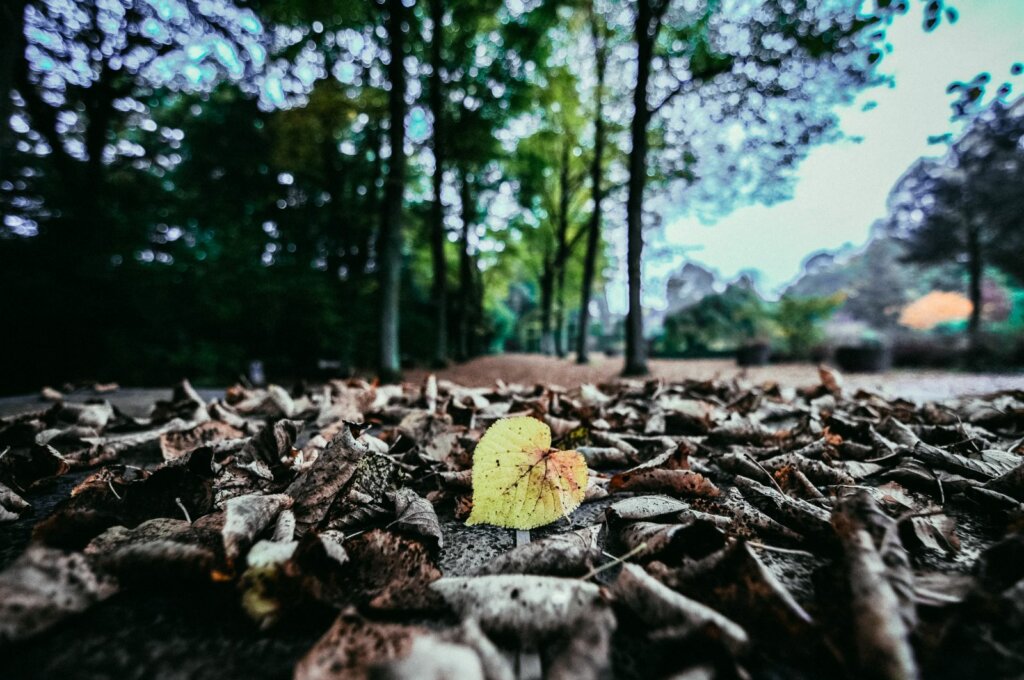
Death also has its place. Photo by davide ragusa on Unsplash
I kept trying new things, new ways of encouragement, new schedules, and even launching a Meetup group, but they all failed. Whereas some people have the story, “I meditated alone for six months, and then people started turning up,” my story is, “I meditated alone for three years, and then Covid happened and I tried meditating in the park and online with local people before giving up and doing that with people who live far away instead.”
In other words, even the first year of the pandemic didn’t deter me and frankly, it was only the allure of meditating with 20 people, albeit online, that was appealing enough that I was willing to give up trying to make a local group meditation happen. One of my life’s lessons isn’t perseverance, it’s knowing when to quit.
These days, I’m learning to quit old ways of thinking and being. The ground beneath me feels shaky as if I’m walking on the beach and the sand is shifting beneath my feet. I don’t know what the heck is going on and I’d like to go back to the way things were. I want to keep watering my metaphorical sow thistle and revive it but the message I’m getting is, “Let it die.”
Leaving behind the familiar is extremely difficult, especially when it used to work. A part of me says, “Wait, I don’t understand! It was working! Why can’t it work again??” but just like with the sow thistle, sometimes it doesn’t. Sometimes you do everything right, you haven’t changed your behavior at all, but the circumstances have. The outside world is different and that means you have to change too.
My spiritual teacher says, “Here in the universe, nothing is stationary, nothing is fixed. Everything moves; that’s why this universe is called jagat. Movement is its dharma; movement is its innate characteristic.”
I wish the universe didn’t keep moving, but it does, and that means I have to move with it. That means I have to let things die even when I really, really don’t want to.
I dream of a world where we understand nothing is static, stationary, or stale. A world where we understand this universe of ours is constantly moving and that means we must move too. A world where we recognize as painful as it may be, it’s important for us to let things die.
Another world is not only possible, it’s probable.
